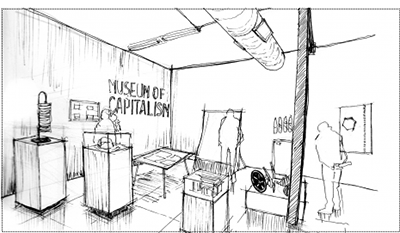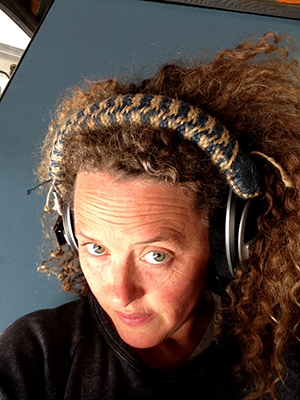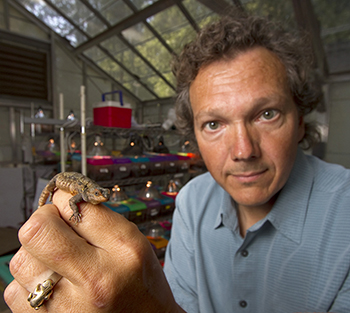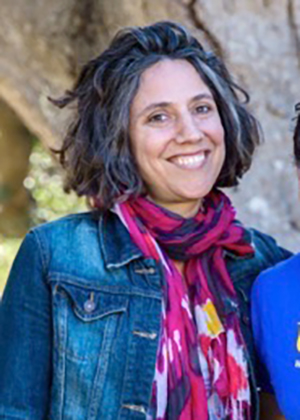The Leonardo Art and Science Evening Rendezvous (LASER) is a national program of evening gatherings that bring artists, scientists, and scholars together for informal presentations and conversations.
The fall event will include presentations by three UC Santa Cruz faculty--Yolande Harris ("Listening to the Ocean in the Desert: Displaced Sounds, Displaced Environments"); Barry Sinervo ("Rock-paper-scissors in Biological, Social and Virtual Worlds"); Miriam Greenberg ("No Place Like Home: Integrating Arts, Humanities, and Social Sciences to Represent the Affordable Housing Crisis in Santa Cruz")--plus Digital Arts and New Media alumni Andrea Steves and Tim Furstnau (FICTILUS: "Prehistory of a Museum of Capitalism").
“We’re thrilled to bring back the popular LASER series with another strong lineup that brings art together with the natural and social sciences,” said John Weber, founding director of the Arts Division’s Institute of Arts and Sciences.
“As always, the idea of the series is to feature brilliant speakers from a wide range of disciplines. We want people who normally only hear art talks to hear about science, or social science. And we want people in the sciences to hear how artists talk about their work.”
Yolande Harris is a UC Santa Cruz art lecturer and sound artist who explores ideas of sonic consciousness and techno-intuition. Her projects consider expanding perception beyond the range of human senses, the technological mediation of underwater environments, and our relationship to other species.
“Her installations often deal with the sonification of data, sound worlds outside the range of human hearing, underwater bioacoustics, and techniques of navigation,” Weber noted. “This will be a great chance to hear from an artist with a real connection to the natural sciences. I know she’s been thinking a lot about whales in the Monterey Bay since moving to Santa Cruz last year, and I’m looking forward to hearing more about that research.”
Barry Sinervo is a professor of evolutionary biology at UC Santa Cruz and director of the UC-wide Institute for the Study of the Ecological and Evolutionary Climate Impacts. He is currently researching contemporary extinctions of reptiles and amphibians, and changes in plant communities driven by climate change at sites distributed on five continents.
“Barry Sinervo has been on my list of top people I wanted to get for the LASER series for a couple of years,” said Weber. “He’s done groundbreaking work in the field of evolutionary biology looking at the mating behavior strategies of lizards. He’s also leading a huge research effort involving nine UC campuses that will utilize the university’s huge Natural Reserve System as a climate change observatory for biotic systems.”
For the LASER talk, he’ll be speaking about lizards and ‘rock-paper-scissors alternative reproductive tactics,’” Weber added. “It will be about lizard sex, and if you want to know more, you need to come to the talk!”
The author of Branding New York: How a City in Crisis was Sold to the World, UC Santa Cruz sociology professor Miriam Greenberg explores the crossroads of urban political economy, political ecology, geography, and cultural studies--with particular interest in the dynamics at play in moments of crisis. She is co-author with Tulane sociologist Kevin Fox Gotham of Crisis Cities, a book about post-crisis redevelopment in New York City following 9/11 and New Orleans following Hurricane Katrina.
“Miriam Greenberg is working to establish what she calls ‘critical sustainability studies’ as a field that connects greening efforts in technology and housing to questions of economic justice,” said Weber. “Living where we do, the urgent need for this should be evident.”
“In California we see an increasing commitment to green technologies such as solar power, wind power and wave power coexisting with dramatic cost increases in housing and hence, urban living. So this is clearly an area that needs more research and action. Miriam’s work with Steve McKay and other UCSC faculty for the No Place Like Home project is looking directly at Santa Cruz, and how we are experiencing this housing crisis,” Weber added.
FICTILIS is the name of the collaborative practice of alumni multimedia artists and curators Andrea Steves and Timothy Furstnau. The word “FICTILIS” is Latin for “capable of being shaped or changed; earthen," which refers both to the form of their practice, and the role it is intended to play within a larger culture. Furstnau and Steves graduated from the Digital Arts and New Media M.F.A. program of the UC Santa Cruz Art Division in 2016. Their talk will be about the history of their recent project, the Museum of Capitalism.
“I first saw Andreas and Tim’s Museum of Capitalism in a sketch form as their M.F.A. show for the Digital Art New Media graduate program here a couple of years ago,” Weber noted. “It’s an idea they’d been working on for a while. Then this summer, the fully realized Museum of Capitalism exhibition was on view in a huge space in Oakland at Jack London Square, complete with a museum book store, mugs, bags, the whole deal!”
“We were blown away by the scale and ambition of the project. It included work by several current and past faculty members here--including Sharon Daniels from Film and Digital Media, Newton and Helen Harrison from the DANM program, and emeritus film and digital media professor Chip Lord--shown with artists from across the U.S. and abroad. There was a great review of the show in the New Yorker this summer,” Weber added, “and we’re thrilled to celebrate the well-earned success of these two recent DANM grads.”
The LASER presentations begin at 7 p.m. in the Digital Arts Research Center building (DARC--Room 108). Doors open at 6:30 pm. Admission is free and open to the public. For more information, contact the Institute of the Arts and Sciences at ias@ucsc.edu.






